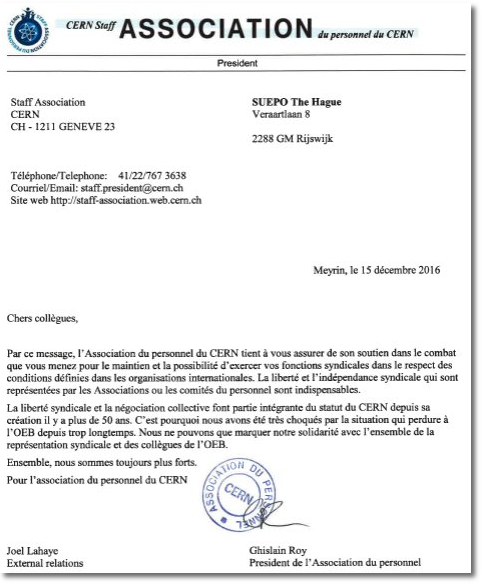12.27.16
Posted in Europe, Patents at 8:58 am by Dr. Roy Schestowitz
The precious snowflakes of EPO management cannot handle criticism from the public

Summary: Willy Minnoye, Ciarán McGinley, Lionel Baranès, Theano Evangelou and others near the top of the EPO pyramid recalled in light of old news about them
THE EPO is about to have an exceptionally tough year that’s agonising to Battistelli’s circle (or “Team Battistelli”), which already falls apart (Minnoye will be leaving before his term ends and so will Ciarán McGinley).
“I very much liked what you published in this article, which I second,” one reader told us, regarding the article that led to the following E-mail being sent to me in March:
Dear Sir,
I would like to refer to the Article/post on the EPO published on the Techrights webpage on the 15.3.2016 which quotes an anonymous reader who inter Alia makes reference to my name Theano Evangelou.
I would like to note that I do not wish to be mentioned neither by name nor would I like to be identifiable. I would thus kindly ask you to withdraw my name or any such information from the blog and not to spread it further. I must further note that I feel personally impacted by such mention.
Yours faithfully,
Theano Evangelou
Some people at the EPO’s management foolishly think we’ll self-censor just because they don’t want to be held accountable for their behaviour. Some even resort to legal threats. These precious snowflakes think that as heads of an international public institution they deserve to live in a cocoon with privacy levels greater than those of the CIA? They want not only immunity from the law but also invisibility (from the public which they purport to be ‘serving’)?
“They want not only immunity from the law but also invisibility (from the public which they purport to be ‘serving’)?”I shared the above letter with someone, who later said to me: “if you want to have a bit of fun with it…. You may ask back if being mentioned as “head of legal department, lawyer” of such an ethically challenging (and challenged) organization is of any bother: If you search in Google for “theano evangelou legal patent”, the first result is her LinkedIn profile in all its pretentious pride. I mean, not just a lawyer, but the Head of the Legal Department! Of EPO! And she feels “impacted” by seeing her name? … give me a break. What a laugh…”
“I think Ciarán McGinley also belongs in the list of rogues,” another person added. “He’s a former SUEPO official turned manager. (This phenomenon isn’t unique to the EPO.)”
Well, McGinley is leaving soon. Maybe seeing SUEPO under attack, combined with a morsel of consciousness, was enough to compel him to withdraw from his “Career Climber” tendencies.
“Remember the PR head that left the EPO almost as soon as he had joined?”“My memories of Lionel Baranès are about as faint as his tenure was brief (2002-2004, IIRC),” told us another person. Well, maybe he didn’t ‘fit in’, so to speak. Remember the PR head that left the EPO almost as soon as he had joined? Not just Vincent Bénard…
Baranès’ open letter of resignation is quite revealing, but few people even care to remember it. If anyone has a copy of that letter, please get in touch with us. █
Permalink
 Send this to a friend
Send this to a friend
Posted in Europe, Patents at 8:17 am by Dr. Roy Schestowitz
The Board of the Organisation admitted there was "a crisis" in 2016. Now it’s time to act.

Summary: Battistelli’s circle (or “Team Battistelli”) is starting to disintegrate, perhaps in anticipation of a tough year full of new leaks (“WillyLeaks” as some put it)
EARLIER this year we saw some big changes at the EPO, where the management is now undoubtedly on the defensive (under growing scrutiny from many directions). We have already found out Battistelli’s salary, who left (statistics indicating brain drain), and who signed off many of the attacks on staff representatives. Battistelli’s circle does not like transparency because it leads to accountability, which is like sunshine to a vampire. What lowers the circle’s morale these days is truth itself, or facts, which is why Team Battistelli blatantly lies so routinely and covers up — even using threats — anything not convenient to its agenda.
“What lowers the circle’s morale these days is truth itself, or facts, which is why Team Battistelli blatantly lies so routinely and covers up — even using threats — anything not convenient to its agenda.”Earlier on (yesterday) we found this new comment stating: “When people retire, it is up to them whether they want an article in the censored Gazette. This chairman would not be the first one to leave without it.”
Now, for those wishing to see the context, it said: “One of the members of the EBA [Enlarged Board of Appeal] who participated in the decision Art 23 has retired. Normally when a chairman of a BA retires, there is an article in the internal journal of the EPO (the Gazette). For this chairman, there is nothing. Is this a mere coincidence? I doubt it.”
This is indicative of the growing culture of secrecy at the EPO, only combated because of sites like ours or groups like SUEPO (although SUEPO is increasingly afraid and thus silent).
“Normally when a chairman of a BA retires, there is an article in the internal journal of the EPO (the Gazette). For this chairman, there is nothing. Is this a mere coincidence? I doubt it.”
–Earlier this year we wrote about yet another ILO case citing the Bernard Paye case (at the time, ILO released dozens of EPO decisions, more than 80% of which ruled against the EPO's management). ILO is, thankfully, starting to handle more of the appeals from the year Battistelli went mad. Recently, two such appeals and the decisions on them served to reveal that Battistelli had made a mockery of justice itself. Taking into account actions by Team Battistelli Against the European Patent Convention (EPC) as well, what we have here and what it boils down to is a regime above the law and doing what’s outlawed. It’s positioned somewhere in Bavaria where no politician has effectively tackled some truly serious abuses (which in the absence of immunity for Battistelli would possibly have him and his goons criminally charged).
We expect a growing number of groups and politicians to scrutinise Team Battistelli in 2017. We have some leaks coming and the more the public knows, the worse it will get for Battistelli. Here is a recent letter (in French) from CERN’s Staff Association:

A year or so ago EPSU and FNV, which represent unions, had already become aware of the situation and wrote letters about it. To quote some text from that time:
The European Federation of Public Service Unions (EPSU) which represents more than 265 unions, and the Federatie Nederlandse Vakbeweging (FNV), the largest union in the Netherlands, have sent a letter to Mr Mark Rutte, Prime Minister of the Kingdom of the Netherlands.
The letter recalls that the judgment of Dutch Court of Appeal gave explicit instructions to the EPO which the EPO decided to ignore by raising an illicit immunity of execution objection: “breaches of fundamental workers’ rights on the Dutch territory are a first serious embarrassment for the Dutch government and that challenging the respect of these rights side by side with an obviously ill-run international organisation before the highest Court of the Netherlands is an even worse embarrassment.”
A copy of the letter was sent to the Dutch Foreign Office and Ministry of Economy, the Ambassadors of the 27 EU Member States in The Hague, Ver.Di (Berlin) and USF (Brussels).
Institutions which are positioned above national laws and claim to enforce their own rules (but don’t, management is exempted also) must be brought under control and those responsible for abuses have their protection stripped off, potentially to face jail time like Sepp Blatter did. Some people actually think that Battistelli too belongs in prison. █
Permalink
 Send this to a friend
Send this to a friend
12.26.16
Posted in America, Law, Patents at 4:17 pm by Dr. Roy Schestowitz
Justice nominations for the US Supreme Court (SCOTUS) will play a big role, and some Justices truly worry about Trump

Reference: Trump escalates attack on ‘Mexican’ judge (this ‘Mexican’ judge was born in Indiana actually)
Summary: In light of Trump’s awkward history with judges (e.g. attacking them) one can hope that upcoming patent cases at the highest court won’t be affected by his pro-big corporations agenda
THE PATENT landscape in the US has changed a lot in recent years, especially after AIA (half a decade ago). Software patents, for instance, are a dying breed. This does not mean that things will continue to improve; they can get a lot worse as soon as a new President is inaugurated, to the chagrin and regret of many Americans. Lobbying of Trump has already begun, for instance by the Internet Association (large corporations, not what it sounds) and by IPO. They want the old order of things and they represent a threat to software developers.
AIPLA, another such entity which acts like a think tank (like oil companies in favour of offshore drilling), is telling the USPTO that they want more secrecy. It makes sense for them. As Patently-O put it the other day, “I would say even after/if the USPTO adopts a rule, be very careful if you have patent agents communicating directly with clients, without supervision of a lawyer, because there’s also the possibility that a court won’t follow the Queen’s University case and hold there is no privilege, anyway. That’s already happened in Texas.”
Well, as new articles continue to stress (the latest being, e.g. [1, 2, 3, 4, 5]), Texas may soon end its status as trolls’ capital, but only if SCOTUS rules rationally. This is yet another blow to the ‘old guard’; it represents patent progress and improvements that favour ordinary people, not oligarchs like Trump and a lot of his prospective cabinet members.
We urge people to support groups like the EFF, which growingly mention software patents and openly oppose these. Latest from the EFF’s Daniel Nazer [1, 2] is this article about this month’s “Stupid Patent”, which he explains as follows:
As you head home for the holidays, perhaps passing through a checkpoint or two, take some time to think about U.S. Patent No. 6,888,460, “Advertising trays for security screening.” The owner of this patent, SecurityPoint Holdings, Inc., has sued the United States government for infringement. SecurityPoint recently won a trial on validity [PDF] and the case will now proceed to a damages phase. So, unless the validity decision gets overturned on appeal, we’ll soon be paying tax dollars for the idea of moving trays on carts.
[...]
In a trial before the Court of Federal Claims, the government argued that this claim was obvious because moving trays using carts was well-known in many contexts. The court disagreed. The court suggested that even if using carts to move trays was well-known, the government needed prior art specifically for security checkpoints (arguably the government had such evidence, but the court disagreed on that point too).
In fairness to SecurityPoint, evidence at trial suggested that it had developed a good system for managing trays and carts within the confined space of an airport security checkpoint. But the patent’s claims are far broader than any specific solution. This is something we often see in patent law: someone develops a (fairly narrow) innovation, but then broadly claims it, capturing things that are well-known or banal. This sort of claiming hurts follow-on inventors who develop their own ideas that wouldn’t infringe any narrower claim, and weren’t invented by the patent holder. But because the broader claim is allowed, their own inventions become infringing. Here, claim 1 is not limited to any particular kind of cart, tray, or scanner. The claim really reads on using a couple of carts to move trays and, in our view, should have been found obvious.
Nazer’s colleague at the EFF has meanwhile advised institutions like universities not to give their patents to trolls. They actually mean “patents”, not “inventions” (as the headline puts it). These are not the same thing. “Research funded by the United States government should benefit everyone,” the EFF explains. “That’s why EFF so strongly supports the idea of writing an open access requirement for federally funded research into the law as soon as possible. It’s also one reason why we recently launched Reclaim Invention, a campaign asking U.S. universities to rethink their patenting policies. It’s crucial that federally funded research be made available to the public so that anyone can read and use it, not just people with institutional connections. But even if the public can read government-funded research, patents on inventions that arise from it can still fall into the wrong hands and undermine the public interest.”
Some universities, desperate for cash (especially in periods of privatisation — the Trump way!), are hoping to make a ‘quick buck’ out of patents that the public actually paid for. This is going to become a bigger issue if schools and universities operate more and more like businesses in the coming years, enjoying no status like they did decades or centuries ago. It means that some universities, with staff that receives public grants, will become litigation mills, directly or indirectly (via trolls).
Speaking of desperate appeals for cash, this new article about Chapter 11 Bankruptcy (a process Trump has gone through plenty of times to secure his billions) says that last “week’s corporate news roundup includes the holding by a U.S. federal appeals court that secured indenture noteholders were entitled to a make-whole premium notwithstanding the issuer’s chapter 11 bankruptcy case, the addition by companies in their securities filings with the SEC of risk factors relating to the outcome of the U.S. Presidential election, and the termination by the PTAB of IPR proceedings as to patent claims between Microsoft Corporation and Enfish LLC, resulting in a non-appealable win for Enfish.”
This goes under “TERMINATION OF ENFISH-MICROSOFT INTER PARTES REVIEW PROCEEDINGS IMPLIED AS UNAPPEALABLE AFTER FEDERAL CIRCUIT DECISION AGAINST MICROSOFT” (a case we covered here before).
In our last article we reminded readers that after Enfish the Court of Appeals for the Federal Circuit (CAFC) ruled repeatedly against software patents, including in very high-profile cases. Unless the Supreme Court with some Trump-appointed Justices chooses to reverse Alice (won’t happen any time soon based on the dockets), it is safe to say that political impact on patent law is still just a distant threat. █
“I can’t imagine what this place would be — I can’t imagine what the country would be — with Donald Trump as our president. For the country, it could be four years. For the court, it could be — I don’t even want to contemplate that.” –Justice Ginsburg
Permalink
 Send this to a friend
Send this to a friend
Posted in America, Deception, Patents at 3:35 pm by Dr. Roy Schestowitz
 Fenwick & West’s Bilski Blog is not a service; it’s marketing
Fenwick & West’s Bilski Blog is not a service; it’s marketing
Summary: Looking at some of the latest promotions of software patents in the US and where this is all coming from (and why)
THE stature of software patents proponents isn’t quite what it used to be (they speak from a position of weakness now) and potency of software patents is at an all-time low. As one legal site put it the other day, a lot of these people now hope that Trump will magically change something (to their advantage). The article states that “Brendan S. Lillis, an associate at Phillips Lytle LLP, concentrates his practice in all areas of intellectual property law, with particular emphasis on patent preparation and prosecution and opinion work in the software, mobile applications and electronic arts.”
“We are generally quite open and frank about the parasitic nature of most patent law firms out there.”The problem is, Lillis works for an industry that profits from litigation and applications that precede litigation. They view things from an entirely different perspective, in the same way that an arms industry views peace negatively (or apprehensively, if they’re publicly polite about it). A legal firm, Banner & Witcoff Ltd, has just given small businesses some really bad advice (to pay legal firms), but what is the point if a small business can barely even afford going to court?
We are generally quite open and frank about the parasitic nature of most patent law firms out there. They pretend to care about “small businesses”, the “small inventor” etc. but all they care about is themselves and huge corporations that bring them the most income (for protectionism). Don’t fall for their marketing pitch!
“Federal Circuit judges spar over software patents,” said the headline from lawyers media the other day. “Will they ever agree?” (behind paywall)
“Notice how, at the same time, pro-software patents sites such as IAM want us to believe that CAFC suddenly loves software patents and things are somehow changing.”Well, in the majority of cases the Court of Appeals for the Federal Circuit (CAFC) rules against software patents, which is all one needs to know. Fenwick & West’s Sachs kept track of pretty much all these cases and generated charts based on these. These charts were very helpful. But what Sachs means by “gift” is software patents. These people are making no (successful) endeavor to hide their agenda/subjective interpretation. Instead of showing some objectivity they are just promoting their own business (profit). They are producing and showing lots of charts and along/between the lines they also interject opinions about whether the outcome is desirable or not — quite unprofessional if this was scholarly work. What they are trying to accomplish at the blog (if it can be called that, as it’s growingly looking like marketing) is squashing of Bilski and Alice. Wolves in sheep’s clothing is what they are and they are exploiting the name Bilski (of the famous patent case) to do this. To quote from their latest post, “Alice Brings a Mix of Gifts For 2016 Holidays”:
As I previously reported, the monthly data showed a drop in the number of invalidity decisions as well as an overall downward trend in the invalidity rate for district court decisions. In December thus far there’s been an uptick in such invalidity decisions (seven thus far) and a few more may issue in the before the year is out. The dotted line above shows the invalidity over three month periods, to smooth out the monthly fluctuations; overall the trend has been downward.
Nonetheless, in October, I cautioned that “I would prefer to see these numbers hold for several months,” because the Federal Circuit “continues to affirm more invalidity decisions than it reverses.” This fact still holds true: there have been nine decisions by the Federal Circuit since October, and they have affirmed ineligible subject matter in seven of them (77%).
Notice how, at the same time, pro-software patents sites such as IAM want us to believe that CAFC suddenly loves software patents and things are somehow changing. They aren’t. That’s usually just agenda disguised as news — something which IAM does a lot of. Therein lies the business model of IAM. █
Permalink
 Send this to a friend
Send this to a friend
Posted in America, Free/Libre Software, Patents at 2:59 pm by Dr. Roy Schestowitz
Not only Microsoft is attacking Free/Open Source software using its software patents
“I find a considerable anxiety throughout the community of practicing computer scientists that decisions by the patent courts and the Patent and Trademark Office are making life much more difficult for programmers. ”
–Donald Knuth
Summary: Free/Open Source software (FOSS), which encourages sharing, is increasingly becoming infested or subjected to software patents barbwire, courtesy of those who want to monopolise rather than share
THE OTHER day we wrote about Blockchain and related technologies coming under attack because of giants that hoard software patents and threaten small players/contenders. A news site dedicated to Bitcoin explains this as follows:
Increasing Blockchain Patents May Soon Hamper Innovation
[...]
Companies count their patents among prized possessions. Having a patent for something important can be worth a fortune, guaranteeing the company a constant stream of revenue until it expires. At the same time, it may also hamper innovation by preventing other from using the technology for free.
Bitcoin and its underlying blockchain are open source technologies and it has gained prominence in the banking and fintech industry lately. The potential of blockchain to change the future of banking has forced many institutions to invest heavily in the development and implementation of cryptocurrency technology based applications.
However, the increased involvement of mainstream institutions has created another problem in the cryptocurrency industry. The banks and financial institutions are increasingly filing patents for various blockchain based solutions that are commonly used by many open source crypto-communities. If these institutions were to gain the patents, then they will soon be dictating terms to Bitcoin and other crypto-platforms, hampering innovation and ease of access to millions of people.
We are beginning to hear more and more stories like this and it matters even more to us because of the direct connection to FOSS and to the Linux Foundation. The other day WIPR showed that Hadoop too, in spite of being FOSS, became subjected to patent wars:
Founded in 2012, Pepperdata provides customers with products that improve the performance of Hadoop-based computing clusters. A computer cluster consists of a set of connected computers that work together.
According to the suit, Yahoo uses Hadoop clusters within the US. It made a software patch identified as YARN-5202, titled “dynamic overcommit of node resources”, which it has used on the clusters.
So anyone who uses this Free/Open Source software can now become the defendant in a patent lawsuit? How does that work? And why don’t more FOSS developers becoming actively involved in ending software patents? This should be our top priority. █
Permalink
 Send this to a friend
Send this to a friend
Posted in America, LG, Microsoft, Patents, Samsung at 2:35 pm by Dr. Roy Schestowitz
Scientists as judges, not just as pressured (from above) examiners

David Ruschke’s ‘official’ photo
Summary: The Patent Trial and Appeal Board (PTAB), led by David Ruschke, continues to function as another ‘layer’ that ensures patent quality by weeding out bad patents and here are some of the latest cases
THE patents and litigation climate is rapidly changing in the US. It’s not just about software patents, but it has a lot to do with them as a lot of litigation emanates from such patents, notably troll litigation.
Just before the days of the holiday (whichever one) we learned about the Patent Trial and Appeal Board (PTAB), which is responsible for invalidating many software patents, being in the midst of this battle:
The Patent Trial and Appeal Board announced on Dec. 2 that it would uphold a patent filed by Securus Technologies, and that the challenge filed by rival company Global Tel*Link (GTL) was invalid. GTL maintains, however, that Securus only won a partial victory.
The patent (U. S. Patent No. 7,494,061 B2) that Securus maintains held up to the challenge from GTL, relates to biometric identity verification monitoring devices used in correctional facilities. According to a summary of the patent, “The term “biometrics” refers to technologies that measure and analyze human characteristics for authentication.”
This patent is a software patent by the sound of it. These are actually the sorts of patents which improperly use terms like “biometrics” to sound as though they’re anything but image analysis, which is my field of research (post-doctoral). It has nothing to do with biology and it’s all typically reducible to mathematics (matrices). Does the appeal board (PTAB) realise this? If not, maybe it’s time to reassess.
Another report, last Updated 6 days ago, is an article about appeals in Korea, published by Jay (Young-June) Yang, Duck Soon CHANG and Seung-Chan EOM from Kim & Chang (patent microcosm). Remember that Korea still blocks software patents (as it should) and we commend this decision, which guards software giants (also hardware giants, not to mention military equipment players) like Samsung and LG — both of which became Microsoft prey for using Linux nearly 9 years ago. We last reported on this 3 months ago (Microsoft wants more 'Linux patent tax' in Korea).
Going back to PTAB, there is a CAFC/PTAB case (CAFC having the authority to object) that MIP explained as follows: “The original Federal Circuit panel decision in the case – written by Judge Reyna and joined by Chief Judge Prost and Judge Stark – was issued on May 25. The court affirmed the Board’s denial of Aqua’s motion to substitute claims 22–24 of a patent concerning automated swimming pool cleaners.”
There is a 9-page PDF in there. As mentioned here some days ago, they are complaining because their patent was granted in error and now they want to change it. Imagine if granted patents were something dynamic you could just amend, edit, expand etc. as you go alone. What a ludicrous thing. Invalidate the patent and if they insist it’s not fair, then they should apply for the patent again (with amended claims).
MIP also explains how to use PTAB to squash bad patents (like software patents) even when it’s not so trivial. “Jim Brogan, Brian Eutermoser and Janna Fischer discuss the ways that the unsuccessful IPR petitioner at the Patent Trial and Appeal Board still can challenge validity in subsequent district court litigation,” MIP wrote.
MIP, to its credit, keeps abreast of PTAB cases (mostly because of Mr. Michael Loney), although it sometimes misinterprets the numbers it puts forth.
In better news about PTAB, here is PTAB having a go at software patents and getting a chance to kill them again. As PatentDocs put it:
Petitioner, iVenture Card Traveler Ltd, filed a Petition seeking to institute a covered business method patent review of all claims of U.S. Patent No. 7,765,128, owned by Smart Destinations, Inc. The Board, applying the standard that requires demonstration that more likely than not Petitioner would prevail with respect to at least one challenged claim, the Board granted Petitioner’s request to institute the CBM review.
We hope that PTAB will continue to do its job improving patent certainty by knocking out a lot of rubbish patents, leaving in tact only those that merit court cases (if any). █
Permalink
 Send this to a friend
Send this to a friend
Posted in Apple, GNU/Linux, Google, Patents at 2:00 pm by Dr. Roy Schestowitz
Nokia is now a de facto patent troll that just licenses the brand

Summary: Nokia’s saber-rattling (and now lawsuits) against Apple are a worrying sign of what’s to come, impacting Android OEMs as well as Apple, which is why the post-Microsoft Nokia is dangerous
TAKING advantage of USPTO-granted patents (for the most part), Nokia started a patent war against Apple just before Christmas [1, 2] and many journalists/pundits were already on holiday, so they did not have a chance to comment. Maybe this was Nokia’s intention as the timing of the press release was at the very least suspicious. Few were even around to cover the followup action, for instance, this complaint that got covered by Matthias Verbergt who said “Nokia Corp. said Thursday [two days before Christmas] it has filed additional complaints against Apple Inc., alleging the iPhone maker has infringed 40 of its patents.” Florian Müller said “Nokia suing Apple over 40 patents in 11 countries” (yes eleven!).
“Nokia is a European company, so there is a concern here that US culture of litigation is spreading to Europe already (the UPC would make a trolling culture even more prevalent if it ever became a reality).”When Nokia/trolls pick on the industry of mobile phones everybody loses, not just Apple. Android too tends to be affected, sooner if not later (than Apple). Nokia is a European company, so there is a concern here that US culture of litigation is spreading to Europe already (the UPC would make a trolling culture even more prevalent if it ever became a reality).
Florian Müller told me that “during the Apple v. Nokia antitrust lawsuit in California” some interesting information is likely to surface. “With Conversant,” he explained, “formerly known as Mosaid, being one of the defendants, I guess MSFT’s involvement will be at issue and MSFT witnesses will be deposed.”
As a reminder, MOSAID received patents from Nokia, at Microsoft’s instruction. This may become very relevant a piece of evidence at a trial/antitrust probe.
“Android too tends to be affected, sooner if not later (than Apple).”“Nokia Is Playing With Fire With Its Patent Infringement Case Against Apple,” one report explained, and another said “Apple and Nokia Could Each Score Victories as Their Patent Battle Unfolds” (usually only the lawyers win in such scenarios). Android sites rightly treat this as Android news because if Apple loses, then expect Nokia to go after Android OEMs too. The latest developments were barely (if at all) covered by the media, probably just as Nokia had hoped. There are now several articles about this in English alone, but if it didn’t happen shortly before Christmas, we’d expect hundreds of reports if not thousands. Matt Levy wrote a poem about this and today (Boxing Day) Müller said that “Nokia’s litigation tactics and privateering ways are, without a doubt, vexatious. So I couldn’t disagree with Apple if it made the case that it’s just not reasonably acceptable for Apple to have to do “business as usual” with a Nokia subsidiary under the present circumstances.”
“Apple should invoke Alice,” Benjamin Henrion (FFII) wrote, “especially for H264 compression algorithms where captive patent courts still allows them…”
Henrion, a Belgian, is well aware of Nokia’s history of patent aggression — a subject we have been covering here since 2007. Take note of this news from Belgium that speaks of “85% tax deduction for qualifying income from patents, copyrighted software, breeders rights, orphan drugs and data or market exclusivity” (sounds like Patent Boxes, but not exactly the same).
“Henrion, a Belgian, is well aware of Nokia’s history of patent aggression — a subject we have been covering here since 2007.”Apple should definitely move to invalidate Nokia’s patents. All patents (there are 40 of them) should be susceptible to criticism, as examiners are not perfect and there are no flawless examinations. Incidentally, Patently-O has just written about “The “Right” to Challenge a Patent” in an antitrust context. “In his recent article,” it says, “Antitrust Economist (and lawyer) Erik Hovenkamp argues that the “right to challenge a patent” should also be an important consideration in antitrust analysis. Hovenkamp defines these “challenge rights” as “the (statutory) rights of third parties to challenge patents as invalid or uninfringed.” Antitrust comes into play when a license or settlement agreement includes challenge restraints that would contractually prevent the exercise of the challenge rights.”
Sounds very much applicable to the case above and as we have said from the very start, we hope that Apple will demolish those patents of Nokia, which might otherwise be asserted against Android OEMs (if this hasn’t been done in out-of-court settlements already). █
Permalink
 Send this to a friend
Send this to a friend
Posted in Australia, Patents at 1:22 pm by Dr. Roy Schestowitz
 Summary: Now is the time for Australian software developers to explain to their government that they don’t want any software patents, otherwise their voices will be hijacked by a bunch of law firms that totally misrepresent them
Summary: Now is the time for Australian software developers to explain to their government that they don’t want any software patents, otherwise their voices will be hijacked by a bunch of law firms that totally misrepresent them
POLLS consistently show that Australian software developers — like developers everywhere in the world — oppose software patents. We covered this before. Earlier this year Australia’s Productivity Commission expressed opposition to software patents. This too is a subject we covered [1, 2, 3].
It didn’t take long for firms like Shelston IP Pty Ltd, a bunch of software patents profiteers (who make nothing at all), to lash out [1, 2, 3] and call for the lobbying against the Productivity Commission, attempting to discredit the Commission. Well, these parasites are at it again and they say (in the headline even) that “[f]ortunately it’s all talk and no action,” but how long for? As we noted earlier this year, this may soon result in a ban on software patents, just like in India. “The Productivity Commission publicly released their Inquiry Report on Intellectual Property Arrangements on 20 December 2016,” wrote the patent microcosm. “The Report examines Australia’s Intellectual Property (IP) system in detail, and makes recommendations to improve its operation.”
The Productivity Commission’s fundings were more properly summarised by another law firm, which said the “final report pulls no punches on patents” (including software patents in particular). To quote:
Yesterday the Productivity Commission published its final report on Australia’s IP system. Our high level summary of the Commission’s recommendations across all aspects of the IP system can be found here.
The Commission sees the patent system as tipped in favour of patent owners and its recommendations are designed to restore balance.
This post provides an outline of the key changes proposed to the patent system.
The Federal Government (Department of Industry, Innovation and Science) is conducting a further consultation process before responding to the Commission’s report and submissions may be made until 14 February 2017.
[...]
3. No blanket exclusion for software patents (for the moment!)
The Commission has not pursued its recommendation in the draft report that software patents be excluded as patentable subject matter. It has, instead, preferred a “wait and see” approach following the decision of the Full Federal Court in the RPL Central which held that the mere computer-implementation of a business method is not patentable.
The Commission considers that the recommendations to raise inventive step (discussed above) and introduce an objects clause (discussed below), are likely to assist in ensuring that software patents are only granted in limited circumstances.
That last sentence is key. No doubt the patent microcosm in Australia, i.e. those who profit from software patents, will aggressively oppose any changes to the law. We therefore need to keep abreast of developments there and urge software developers in Australia to get actively involve, as we shall soon do. █
Permalink
 Send this to a friend
Send this to a friend
« Previous Page — « Previous entries « Previous Page · Next Page » Next entries » — Next Page »





 Fenwick & West’s Bilski Blog is not a service; it’s marketing
Fenwick & West’s Bilski Blog is not a service; it’s marketing

 Summary: Now is the time for Australian software developers to explain to their government that they don’t want any software patents, otherwise their voices will be hijacked by a bunch of law firms that totally misrepresent them
Summary: Now is the time for Australian software developers to explain to their government that they don’t want any software patents, otherwise their voices will be hijacked by a bunch of law firms that totally misrepresent them
























 Content is available under CC-BY-SA
Content is available under CC-BY-SA